The University of Waterloo hosted its seventh TEDxUW event on Oct. 13. The event, entitled “Making Waves,” was attended by over 400 people and provided delegates the opportunity to listen to trendsetters in their respected fields.
There were eight speakers in total with an area of expertise as diverse as the university itself. From the fields of mental health, social media, environmental entrepreneurship, tourism and poverty to optometry and leadership; there was a conscious effort made to accommodate the interest of students from various disciplines.
Andrea Hardy was one of the speakers at the event. Hardy, a registered dietitian, and owner of IGNITE NUTRITION INC., is on a mission to communicate authentic evidence-based scientific studies about gut health and digestive disorder. Hardy spoke about the importance of people educating themselves when it came to dietary information available online and through the media.
“The biggest thing is to question misinformation. We get inundated with messages, and people get overwhelmed. Nutrition is not complicated but how the media portrays it makes it look so,” Hardy said.
She cautioned against quick fixes that seem to constantly appear in the media discourse.
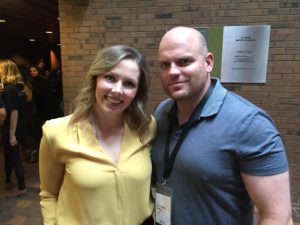
“They sensationalize research and misuse research to create catchy stories which end up confusing people. Every food group has been villainized because it makes for good stories and it sells people on products and easy solutions.”
Hardy spoke about the difficulties that she and other people face when trying to get the right information.
“It’s hard to know who is credible, especially when on social media anyone can look credible with a huge following. They spread messages that are highly connective and spread fear.”
Hardy provided a simple, yet effective, solution to making sure that the content which is being consumed is authentic. She recommended doing a “Gut Check.”
“Notice how your body reacts to a message. If it creates fear and tightness of the chest, guttural reaction, it is probably not true,” Hardy said.
Tina Chan was speaking at the event for the first time. Chan, a Master’s of Science candidate at the University of Waterloo’s School of Public health and Health Systems, invented the PASS kit; a first-aid kit for mental health that has sold over 15,000 units worldwide.
“I have done public speaking before, but I had to take it to the next level. There were months of preparation leading up to this. I respect the TED brand,” Chan said.
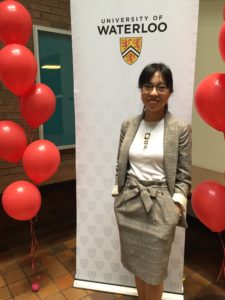
She further opened up about her own mental health challenges when transiting from high school to university.
“When I went to university I found myself in a cycle of self-hate and fell into mental illness. Managing mental health is a daily task. No one is perfect at it.”
During her speech, Chan stressed the importance of understanding mental health issues.
“No one wants to know how wet the water is when you are drowning.”
Chan concluded by saying that before making waves it is important to know what is already in the water.
Speaker Dr. Meghan Muldoon, an assistant professor with Arizona State University, was attending the event with her parents. Muldoon’s area of expertise encompasses sustainable tourism. Her mother said that she was very happy and that this was a proud moment for her.
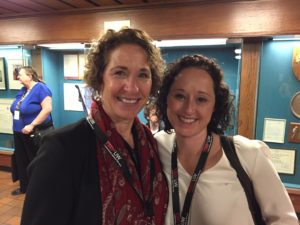
When asked what advice she would like to give the crowd, Muldoon spoke candidly.
“A hard lesson for me was that you can’t be everything for everyone. It took time for me to realize, and going through a bunch of difficulties it allowed me to focus on what I really loved, and that was tourism.”
Muldoon is keenly aware of the negative environmental impact of the tourism industry.
“Tourism is not going to stop, so our challenge is how to do it better in a more sustainable way.”
Husband and wife Carlo and Ciara Catingan were delegates attending the event.
“I did both my undergraduate and postgraduate studies here. I am an alumnus of the university, so I always knew that this event was here. But this is our first time attending. We tried last year but the tickets sold out fast,” Carlo Catingan said.
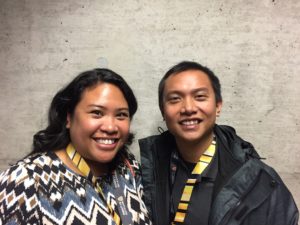
“I did not know what to expect before coming here. There is a certain energy here that you cannot get by just being in front of the computer,” Carlo said.
Ciara Catingan admitted it was a bit intimidating but she was happy she came.
“It is very empowering to be in a room with people who are interested in making positive changes and to do something meaningful. It makes you feel that everybody and anybody can do their part.”
Anne Filion, another delegate at the event, was very excited to attend.
“It’s a place where learning becomes exponential. I am sure I can come out with ideas and meet like-minded people,” Filion said.
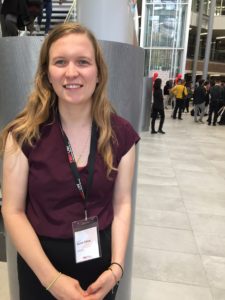
Filion said this was her first time attending the event as well.
“It is very different than watching speakers online. It is easy to put a wall between yourself and the speaker when you have a screen in front of you. But here they are in front of you and you can connect with them. The environment is amazing. You can feel the inspiration in the room.”
TED, which stands for Technology, Entertainment and Design, launched in 1984 as a nonprofit organization dedicated to the spread of ideas through short powerful talks. TEDxUW is an independently hosted event based on the TED format that gives students at the University of Waterloo the TED experience.

